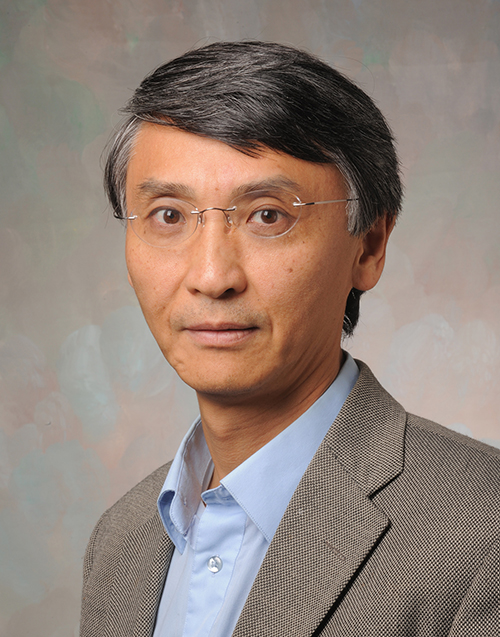 Dr. Shi-Qing Wang is a leader in polymer rheology and mechanics and the Kumho Professor of Polymer Science. We recently had the pleasure of speaking with Dr. Wang about his career at The University of Akron’s School of Polymer Science and Polymer Engineering (SPSPE). Read more about his life and career below.
Dr. Shi-Qing Wang is a leader in polymer rheology and mechanics and the Kumho Professor of Polymer Science. We recently had the pleasure of speaking with Dr. Wang about his career at The University of Akron’s School of Polymer Science and Polymer Engineering (SPSPE). Read more about his life and career below.
Tell us something about yourself:
I grew up during the tumultuous period of the Cultural Revolution and had to play the catch-up game in college. So, I knew all along that my background was deficient and I needed to work hard. As a China-U.S. Physics Examination and Application (CUSPEA) student, I had the fortune to get my PhD at the University of Chicago. But, only in my vague daytime fantasy did I dream of becoming a professor in a major research program like the School of Polymer Science and Polymer Engineering at The University of Akron, which is clearly the best job on earth that anyone would hope to have.
What were the driving factors in your decision to join the SPSPE faculty?
After finishing my doctoral and postdoctoral training in a narrow area of theoretical studies of dilute polymer solutions, in 1989 I became an assistant professor of Macromolecular Science and Engineering at Case Western Reserve University. In 2000, I joined UA. Twenty-one years have passed and I know I made the right decision. Here we have been able to build an impactful research program, working on rather crucial areas of polymer science and engineering that are generally too difficult to make progress: molecular level understanding of all mechanical aspects of polymers in their liquid state (known as rheology) and solid state (known as mechanics).
What’s your teaching philosophy or your outlook on higher education?
Philosophy touches my heart. Good scientists are good philosophers. Oddly enough, STEM researchers may not be aware of the importance of philosophy until they meet paradigm shifts. So, this is a major problem/question facing higher education: have we made our students sufficiently aware of the essence of doing science, i.e., to tell the truth, and how to do it? I also joked in class about winning $1 billion in the lottery so that I could set up a graduate school where there is no barrier or boundary between experiment and theory. The two activities must be internalized. In other words, experimental tests and theoretical contemplations must take place in one mind, not two.
What are some of your favorite things to do when you’re not teaching?
My career has been a nonstop ride. I have yet to take a sabbatical leave after 32 years of teaching. But, please don’t get me wrong: doing research is an endless marathon. So you don’t use up your energy in one day and feel tired the next day. The secret of success is to keep at it and never let go, until your balloon bursts, and the breakthrough occurs. I have said to my students that doing research is like blowing a balloon with the purpose of bursting it. If you only blow once in a while, leaking occurs, and it will never burst. Intensity matters and is the key. My favorite thing to do is “keep thinking” for anything that we confront. For example, have we found an alternative to capitalism? That’s a hard question.
What do you love most about your job at The University of Akron, and your work on polymers?
UA has been a paradise for doing great research. I prefer UA over MIT. I get to do research in depth instead of dealing with bean counting. The quality of research is far more important than the quantity of papers. I am surrounded by colleagues devoted to polymer research. We are uniquely strong in this area. It is enough for me to focus on the deepest questions of polymer science and engineering. In other words, I am content to build a deeper knowledge about polymers, a subject that is 80,000 scientists/engineers strong on the world stage, according to a recent Stanford report.
What are your goals for SPSPE? How do you plan to achieve those goals?
It is my hope that we can emphasize our strength in various specific areas of polymer science and engineering. For example, we have strong research on sustainable polymers and mechanics of polymeric materials. Sustainable polymers are useless unless they have adequate mechanical characteristics. So these two fields in combination can become a central theme at Akron. Specifically, I hope we can develop a basic chain-level understanding of the mechanics of polymers that can be applied to make sure that the sustainable polymers achieve adequate mechanical strength.
What is one thing that you hope each of your students learns from you?
I have had enough students. I will have thirty PhD students in a few years. That’s plenty. They all see one thing from me: respect the truth and verify the fact. Whenever I have a chance, I show them honesty. That is the backbone that supports integrity.
